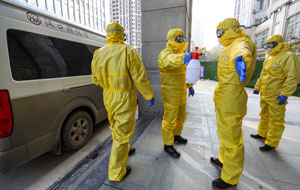Associated Press
Coronavirus Emergency Declared; WHO Downplays Trade Impact

[Stay on top of transportation news: Get TTNews in your inbox.]
GENEVA — The World Health Organization declared the coronavirus outbreak that started in China a global emergency Jan. 30 after the number of cases worldwide spiked more than tenfold in a week.
The U.N. health agency defines an international emergency as an “extraordinary event” that constitutes a risk to other countries and requires a coordinated international response.
A declaration of a global emergency typically brings greater money and resources, but may also prompt nervous governments to restrict travel and trade to affected countries. The announcement also imposes more disease reporting requirements on countries.

Funeral workers disinfect themselves after handling a virus victim in Wuhan on Jan. 30. (Chinatopix via Associated Press)
In the wake of numerous airlines canceling flights to China and businesses including Starbucks and McDonald’s temporarily closing hundreds of shops, WHO Director-General Tedros Adhanom Ghebreyesus said the organization was not recommending limiting travel or trade to China.
“There is no reason for measures that unnecessarily interfere with international travel and trade,” he said while speaking to reporters in Geneva.
China first informed WHO about cases of the new virus in late December. To date, China has reported more than 7,800 cases, including 170 deaths. Eighteen other countries have since reported cases, as scientists race to understand how exactly the virus is spreading and how severe it is.
Experts say there is significant evidence the virus is spreading among people in China and have noted with concern instances in other countries — including the United States, France, Japan, Germany, Canada, South Korea and Vietnam — where there have also been isolated cases of human-to-human transmission.

Construction workers labor at the site of a temporary field hospital in Wuhan on Jan. 30. (Arek Rataj/Associated Press)
“The main reason for this declaration is not because of what is happening in China but because of what is happening in other countries,” he said. “Our greatest concern is the potential for this virus to spread to countries with weaker health systems which are ill-prepared to deal with it.”
The United States confirmed the first case of person-to-person spread of the virus. The man in the U.S. is married to a 60-year-old Chicago woman who got sick from the virus after she returned from a trip to Wuhan, the Chinese city that is the epicenter of the outbreak.
Dr. Jeremy Farrar, director of Britain’s Wellcome Trust, welcomed WHO’s emergency declaration.
“This virus has spread at unprecedented scale and speed, with cases passing between people in multiple countries across the world,” he said in a statement. “It is also a stark reminder of how vulnerable we are to epidemics of infectious diseases known and unknown.”
Want more news? Listen to today's daily briefing:




